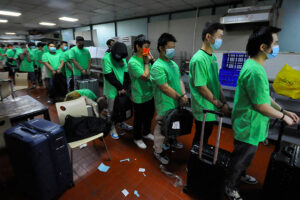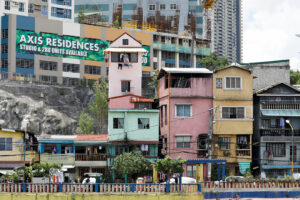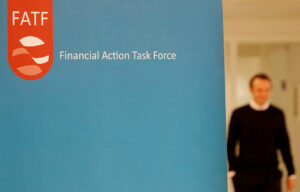THE IMMIGRATION bureau and gaming regulator should work together to shutter illegal Philippine Offshore Gaming Operators (POGO) and cancel the visas of foreign workers linked to crimes, a senator said on Thursday.
“Aside from security concerns raised on POGO operations near our military bases, reports on some 250 others operating without licenses should prompt our concerned authorities to conduct a crackdown on these illegal entities,” Senator Jose “Jinggoy” P. Estrada said in a statement.
“Through the cooperation of the Bureau of Immigration and Philippine Amusement and Gaming Corp. (Pagcor), they should not hesitate to shut down illegal or unlicensed POGOs,” he added.
Immigration spokesperson Dana Krizia M. Sandoval and Pagcor did not immediately reply to separate requests for comment via Viber and e-mail.
Mr. Estrada’s call comes after the reported discovery of Chinese military uniforms in a POGO hub raided by authorities in Porac, Pampanga in northern Philippines last week.
Defense Secretary Gilberto C. Teodoro, Jr. on Wednesday said criminal syndicates posing as POGOs, which are mostly Chinese gambling companies that operate online casinos from the Philippines, are national security threats and must be stopped.
“We should stop these criminal activities operating out of our base, which weaken our financial standing, our country ratings (and) corrupt our society,” he said in a statement.
Several congressmen on Tuesday filed a bill that seeks to ban POGOs and impose a 10-year jail sentence on those that continue to operate under a ban.
Senator Sherwin T. Gatchalian earlier filed a similar bill, saying POGO links to crime outweigh their economic benefits.
“In addition to the proliferation of heinous crimes associated with POGOs, the industry has raised serious national concerns that must be associated promptly and with strong political will,” he said in a separate statement on Thursday.
“As Defense secretary, he (Mr. Teodoro) possesses privileged information and intelligence that convinced him to make that statement,” Mr. Gatchalian said.
The Senate is in the middle of a probe into crimes linked to these gambling operations.
The Ombudsman has ordered a six-month suspension on Bamban City Mayor Alice L. Guo over her alleged involvement in human trafficking and other crimes linked to POGOs in Tarlac.
The mayor has denied the allegations. Her lawyer on June 3 said the business permit issued to one POGO in her province was above board and based on Pagcor recommendations.
About 4,000 people were victimized by POGO-related crimes in the first half of last year, the Philippine National Police said in October.
The presidential palace in April ordered the Anti-Money Laundering Council to freeze the assets of a POGO hub in Tarlac province in northern Philippines, where 868 POGO workers were rescued during a March 13 raid after the company was linked to human trafficking and torture crimes.
Meanwhile, in an advisory on Thursday, the Department of Foreign Affairs (DFA) said Chinese nationals applying for temporary visitor’s visas must now submit their Chinese social insurance record certificates.
The certificates must be valid for at least six months.
Chinese students with proof of enrollment and retirees above 55 years old are exempted from the requirement.
“The additional visa requirement is part of the DFA’s continuing efforts to enhance its visa policies and regulations for the safe and efficient entry of foreign visitors,” the agency said.
Economists have said offshore gambling operators complicate Philippine efforts against money laundering and work against its ambition to become an investment hub.
The Philippines has been under the Financial Action Task Force’s (FATF) gray list of countries under increased monitoring for dirty money since 2021, in part due to its loosely regulated gaming sector.
Congress under ex-President Rodrigo R. Duterte passed a law taxing POGOs to legalize them, despite mounting concerns about the social costs of gambling.
The sector has grown exponentially since 2016, as operators capitalized on the country’s liberal gaming laws to target customers in China, where gambling is banned.
At their peak, POGOs employed more than 300,000 mostly Chinese workers, before a coronavirus pandemic forced many of them to transfer operations elsewhere. — John Victor D. Ordoñez





